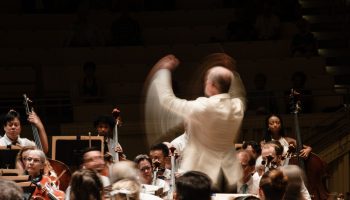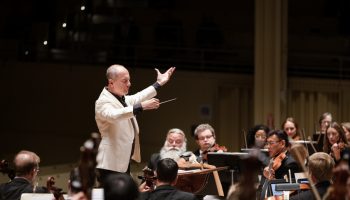
Liz DeLillo
Staff Writer
For the past two weeks, a talented and multidisciplinary array of artists have been hard at work in Norton Hall, bringing a new opera to life. And at 3:15 p.m. today in Norton, those artists will share highlights from Lincoln in the Bardo, in the adaptation’s first-ever public presentation with orchestra.
“I’m very excited for people to get to breathe with an audience as they hear these selections with the orchestra for the first time — the first time that we offer them to the world,” said librettist Royce Vavrek.
Following the workshop presentation, composer Missy Mazzoli, Vavrek and George Saunders will lead a discussion about the piece.
The two-week orchestral workshop has been conducted in partnership with the Metropolitan Opera, which commissioned the work; those involved include musicians of the Chautauqua Symphony Orchestra, all 16 Young Artists from the Chautauqua Opera Company, 18 Voice students from the Chautauqua Opera Conservatory, as well as renowned soprano Christine Goerke, for whom the role of The Reverend was written.
Lincoln in the Bardo is an operatic adaptation of Saunders’ 2017 Man Booker Prize-winning novel of the same name. The Metropolitan Opera commissioned Mazzoli to compose the opera in 2018, making her one of the first two women — alongside Jeanine Tesori for Grounded — ever commissioned by the Met. The piano and vocal workshop for Lincoln in the Bardo took place in 2023 with the Cincinnati Opera and Cincinnati College-Conservatory of Music. The opera is slated to make its world premiere at the Met during its 2026–27 season.
Saunders attended the Cincinnati workshop and shared how powerful it was to see his story come alive on stage.
“There were a lot of young student musicians who were participating in (it),” Saunders said. “You see them moved by it, see them really inhabit it, and it makes you feel so grateful … to be part of something like this.”
He said the creation of the operatic adaptation has been a rich experience, as hearing the music provided further insights for his literary work. He’s enjoyed working with Mazzoli and Vavrek, as he said they truly grasp the story and its significance.
“The first thing that they did really beautifully is they kept the humor in it, so that both of them have that same feeling that I do — that you don’t want to be solemn,” Saunders said. “You want to be serious, but you don’t want to be solemn, so there’s a lot of joy in it and real risk taking and crazy musical things going on.”

The plot follows Abraham Lincoln mourning his recently deceased son Willie. At Willie’s grave, Lincoln delves into a spirit realm — or bardo — and the real story begins. Set in 1862, this tale of historical fiction delves into themes of loss, love and morality.
Mazzoli is a Grammy-nominated composer particularly known for her inventiveness and creativity with sound. She composes for a variety of works, such as opera, chamber music, orchestra, film and television. Mazzoli is the recipient of many awards, including the 2022 Composer of the Year honor from Musical America, the 2017 Music Critics Association of America Inaugural Award for Best Opera as well as four ASCAP Young Composer awards.
When the Met reached out to Mazzoli regarding a new opera, she said that she’d immediately suggested an adaptation of Lincoln in the Bardo. Saunders is one of her favorite authors, and she thoroughly enjoyed the novel.
Mazzoli is known for the unique sounds she is able to create within classical compositions — Lincoln in the Bardo includes kazoos in one scene’s orchestration. When paired with a backdrop of more traditional classical music, the sounds come together in an air of uneasiness.
“With the kazoo sound mixed in, it just makes you a little bit uneasy,” Goerke said. “… It doesn’t feel quite normal.”
In another example, Goerke recalled how elated she was when, in one of Mazzoli’s other operas, she heard an electric guitar in the mix.
“She has a really interesting tonal palette, always, but what I love about her is she will give you absolutely traditional orchestral sound and then just throw a wrench in it and create a sound that you’re not expecting mixed in,” Goerke said. “… Her orchestral textures are very singular, and I always feel like I know if I’m listening to one of her works.”
Mazzoli and Vavrek, the librettist of Lincoln in the Bardo, have collaborated before. In 2023, The American Academy of Arts and Letters awarded Mazzoli and Vavrek the Marc Blitzstein Award for Musical Theater and Opera. The pair’s previous operatic works include Breaking the Waves, Proving Up, Song from the Uproar and The Listeners.

Vavrek is an award-winning librettist and lyricist as well as the artistic director of Against the Grain Theatre, Toronto’s experimental opera company. He has created numerous artistic works with Paola Prestini, David T. Little and Mikael Karlsson. Among many other artistic projects, he created the opera Angel’s Bone with composer Du Yun, which won the 2017 Pulitzer Prize for Music.
Goerke, an internationally celebrated soprano, first encountered Mazzoli and Vavrek’s work at the dress rehearsal of the premiere for their opera Breaking the Waves, she said.
“I have never felt such an emotional drain,” she said. “I was sobbing at the end of it, and I thought, ‘This has changed how I look at opera forever’ — and so they gained me as a super groupie.”
Goerke’s repertoire includes Mozart, Handel, Strauss and Wagner. Through her voice and performance, she has received the 2017 Opera News Award, the 2015 Musical American Vocalist of the Year Award as well as the 2001 Richard Tucker Award.
But this is her first role written specifically for her own voice, and Goerke is ecstatic to be playing The Reverend. After receiving the first version of the vocal score, she called Mazzoli to express her gratitude.
“It really is tapered from my instrument. It is created for what I do best — and what a joy that is,” Goerke said. “Truly, I am so grateful.”
However, it was not just Goerke who revels in the collaboration.
“She’s such a huge part of the soul of this piece,” Vavrek said of Goerke. “She’s somebody that we wanted to write for forever, and so getting to do this with her is just such a dream come true.”
Having greatly enjoyed the novel, finding it “absolutely astounding,” Goerke said that “in Missy and Royce’s hands, it literally jumps off the page.” In her view, Lincoln in the Bardo is a historical work that is incredibly rich for contemporary audiences.
“It’s kind of an amalgam, but what I love about it is it does have historical truth in it, but it also gives us permission to imagine what might be happening,” she said. “We need that hope, we need that imagery, (and) we need that reality in our lives.”
Vavrek agreed, and believes the story’s relevance elevates itself.

“It does feel like it really does belong to the 21st century in a way that I think is so beautiful and exciting and strange, and it adds to a surreality,” Vavrek said.
Moreover, the historical setting of the story influenced his writing, providing insights into his creative process.
“There’s a line in the libretto where the character of Havens sings, ‘If this is a sadness party,’ and it’s been a line that we’ve thought about,” Vavrek said. “It does sort of sound contemporary, but in a contemporary parlance, it would be ‘a pity party,’ — and so it’s kind of a beautiful, clever way of a throwback, but it does have this contemporary edge
to it.”
He particularly enjoys the creative dynamic for adaptations of written works and engaging with someone else’s rhetorical style. Working with “other people’s ideas and finding ways to make them sing” broadens his own voice.
“I really enjoy taking pre-existing material because it breaks my language open. I become less tethered to my own creative rhythms,” he said. “It sort of forces me into new shapes and using different diction than I would normally use, and so it stretches me, which I really enjoy.”

Working with Mazzoli is “a very organic process,” Vavrek said. They have been close friends for years and collaborated on many artistic endeavors, with Lincoln in the Bardo marking their sixth opera created together.
“Even though we understand each other and we speak a common language now — a common operatic language — each project provides new, exciting, dramatic problems to solve,” Vavrek said.
He said Chautauqua Institution is “a really great place to investigate work,” and that he and Mazzoli are elated to return for the workshop. The pair came to Chautauqua in 2016 for their opera Song from the Uproar, performed by Chautauqua Opera Company.
“We’re thrilled that Steve, Maestro Osgood, has given us this opportunity because he’s truly the best, and we learn so much,” Vavrek said. “I don’t know of anybody who is as singularly skilled at being the midwife for new operas in the most glorious way.”
General and Artistic Director of the Chautauqua Opera Company Steven Osgood underscored that the Opera Company has embarked on many cross-disciplinary collaborations but “not of this scale or of this ilk before.” While the CSO, Opera Company and Conservatory have collaborated with each other often, he said, what is new is “this nexus of cross-platform collaboration” with masterclasses, lectures and literary arts programming.
“It’s fun that everybody’s got a little bit of themselves in Lincoln and the Bardo, and the fact that it is this project — this collaboration — that we, the Opera Company, were able to bring to Chautauqua — it was very satisfying,” Osgood said.
Staff writer Susie Anderson contributed to this report.





